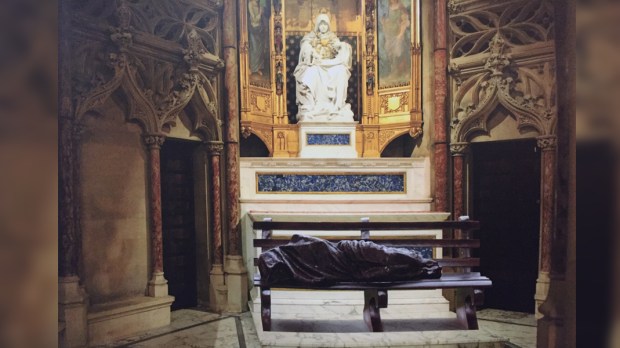The sculpture titled “Homeless Jesus” can be seen in several locations around the world, but none as surprising as the Church of the Immaculate Conception, on Farm Street in Mayfair, London. Anyone who has played the UK version of the board game Monopoly will know the value of Mayfair — the equivalent of Boardwalk in the USA. Despite being among the most exclusive Catholic parishes in the world, Immaculate Conception is also one of the most inclusive.
London has always had a reputation for legions of the homeless, whose unkempt and often unwashed presence encourages the authorities to move them on swiftly, especially in the City of Westminster. Not in the vicinity of Farm Street though. The Jesuit priests there intend to place the sculpture on the inside of their church. Timothy Schmalz’s life-size bronze representation of a figure huddled under a blanket on a park bench will be placed before the Shrine of Our Lady of Seven Dolors. The wounds on the Mother of Jesus provide an allusion to the holes in the feet of the statue, the only clue to the identity of the subject. They also provide a link to the nails in the Jesuit emblem.
Other versions of this sculpture are located outdoors, which may seem a more natural location. This has led to misunderstandings, such as concerned residents calling the police to inform them about a vagrant using a community facility. In reality, very few “rough sleepers” have the luxury of an undisturbed night on a traditional park bench. They are invariably chased away, and instead rely on bus shelters and doorways, often fitted out with deterrent spikes.
The response to the sculpture has sometimes been more positive than the response to the homeless. Members of the public often sit next to the figure and pray. For less-religious passersby, it has proved to be a poignant reminder of the thousands of Londoners who sleep in the most distressing conditions. For the priests at Farm Street, the positioning of the sculpture near the pulpit is intended to remind themselves of the desperate situation beyond their pristine church premises.
Among the figures to welcome the sculpture is Pope Francis. Along with his fellow Jesuits at Farm Street, he has been an unfailing champion of the homeless, and has provided free laundry services and showers and washed the feet of refugees. Last week he handed out ice creams as a morale and calorie booster to celebrate his saint’s day (St. George). His Holiness blessed the Homeless Jesus as long ago as 2013.
The Jesuits who welcomed the sculpture into their church have a long tradition of reaching out to the most marginalized. There are night shelters and all types of support offered to London’s homeless. Like the pope, they are also fully committed to refugees — many of whom end up on the street.
Farm Street, as it is known, was made famous through its many literary associations. This was the church that produced some of Britain’s most celebrated Catholic converts, including Graham Greene and Sir Alec Guinness. Most famous of all is Evelyn Waugh, whose definitive novel about the English class system, Brideshead Revisited, gives due prominence to Farm Street.
So far, the congregation has reacted favorably to the new resident. Meghan Markle, the new member of the royal family, made headlines recently by hugging a homeless-charity worker. The future head of the Church of England, Prince William, showed his compassion for the homeless once by spending a night sleeping rough on a London street in the middle of winter, with only minimal security and a thin blanket for protection. It seems to be a family tradition as William’s earliest memory is of Princess Diana taking him to a homeless shelter. Perhaps the youngest member of the royal family, Prince Louis, will get to see “Homeless Jesus,” as his palace is a brisk stroller-ride away on the other side of Hyde Park.

